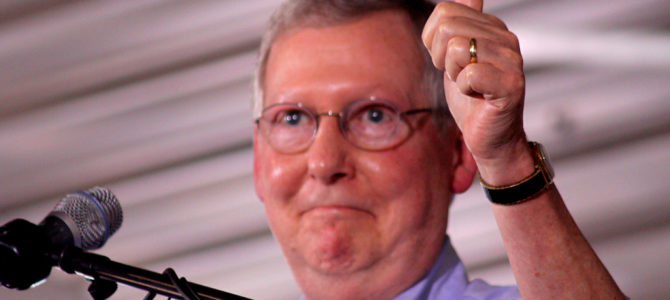
Writing at Slate, National Review’s Reihan Salam welcomes Jeb Bush’s official entrance into the 2016 stakes by asking him to drop out.
“You know the basic argument: Fairly or unfairly, the Bush brand is tarnished, and Jeb Bush will have little choice but to be seen as a stand-in for his still unpopular older brother. Bush is a figure who has been around for a long time, and it’s possible that he’s too stale for an electorate hungry for change. I buy the idea that Bush has unique liabilities that would hurt him badly in a general election.”
But as Reihan sees it, winning the nomination will require Bush to employ a scorched-earth strategy detrimental to the GOP’s prospects:
“Despite the fact that he is in the same ballpark as Gov. Scott Walker, Sen. Marco Rubio, and Ben Carson in poll after poll, he is in a much stronger position to win the nomination than any of them. So what does it mean if Bush has a very good chance to win the GOP nomination but very little chance of winning a general election? It means that a scorched-earth Bush campaign will make it impossible for any Republican to win in 2016.”
I largely disagree with this. In fact, I think Jeb Bush’s presence in the 2016 field serves an enormously useful purpose for the Republican Party, and may be essential for it to win in 2016 and beyond.
In the 2008 and 2012 presidential elections, Republicans never really adjudicated the outcomes of the George W. Bush years. The absence of a reconsideration of lessons learned from the financial crisis, the Iraq War, Bush era security policies, No Child Left Behind and the compassionate conservative domestic agenda took place behind the scenes, not on the campaign trail. This is in part because there was no Bush proxy in either field. Dick Cheney didn’t run, nor Donald Rumsfeld, nor even anyone directly associated with compassionate conservatism. None of Bush’s Texas crew, insofar as he really had one, ran in either year.
For the more than 20 presidential campaigns mounted since 2008, none of the candidates has been compelled to give a straight answer about what they think about George W. Bush’s eight years. A vote for Mitt Romney or John McCain or Rick Santorum or Mike Huckabee or anyone else couldn’t be seen or felt – by fans or detractors – as a vote for W.
A Cleanse, Not Chemo
This time, it’s different. This time the party has a candidate who does represent a proxy for those eight years, and at a safe enough remove from the worst of 2008 that the process of reconsidering those years can now be a much kinder and gentler process for Republican primary voters. The younger candidates in the field don’t have to run all that hard against W. (or maybe even Jeb) to win, and voters don’t have to be made hate him. It’s as if you could find a diet cleanse that actually worked – no heavy duty medicine, no chemo – you’ll have to eat some weird stuff for a while and your hair won’t fall out.
As for the practical political hardball involved, Salam’s logic regarding Bush’s potential path to the nomination isn’t wrong, but I think it is overly pessimistic. With the twin current policy liabilities of immigration and Common Core, Jeb is out of step with the conservative voting base on two litmus test issues and he knows it. Winning will likely require him to point out the litmus test problems in other candidates on guns, Obamacare, abortion and more. But it will be more important that Bush defend his own record than tearing down the other candidates, and the field he faces is much stronger than what we saw in 2012. Yes, his money advantage will be sizable, but it will not be so large as to eliminate the path for other candidates. And he has the unique disadvantage of being the only candidate (other than Hillary Clinton) to be forced to defend, while also critiquing, the records of two presidents who are not him.
Yet I also believe Jeb Bush is not the sort of politician given to employing the kind of Death Star strategy we saw in 2012, focused on demolishing the other candidates in the race. Bush really does care about the future of the GOP, and he’s not willing to nuke the next generation of candidates in the party in order to get the nomination. Unlike other recent Republican nominees, Bush’s personal conviction that the country needs him is not paired with a belief that no other candidate in the field can win, nor a belief that all others are compromised or irresponsible men and women unfit for the presidency.
The Need for Introspection
For a decade, Republicans have inhabited a party that needed to enter a period of introspection has largely rejected new ideas like white blood cells, rather than absorbing the good and discarding the bad. The Republican Party that learned the right lessons from the Bush years could be one that understands how much the existing power dynamic requires free market disruption in order to devolve power to the states and individuals – instead of one that has been stuck in amber since 2000, with the verve and innovation of Jurassic Park’s ubiquitous mosquito.
That’s why the two candidates who matter the most to the future of the GOP in 2016 and beyond are the two who have the strongest name brand appeal, based not just on their own actions but those of their family members: Jeb Bush and Rand Paul. A healthy Republican Party will find a way to digest both the Bush brand of compassionate conservatism and Paul’s libertarianism – retaining what nutrients can be put to good use, and discarding what cannot. Jeb’s presence in the field is absolutely essential to this process. It is unfair that he will have to defend the records of those who share is name, but it is also necessary, and it is also good.
The Republican Party has largely avoided coming to terms with the Bush years. Since the 2006 loss of Congress and the bad years of 2007 and 2008, they chose the path of least resistance internally, and got Obama in large part as a result of their lack of introspection. Now the path of least resistance allows for a soft rejection, a gentle turning of the page on the Bush years – and it offers that only because Jeb is running.
Plus, if he leaves the field now, who knows what would happen. Wait… is that Mitt Romney’s music?

Yeah, let’s not tempt fate.









